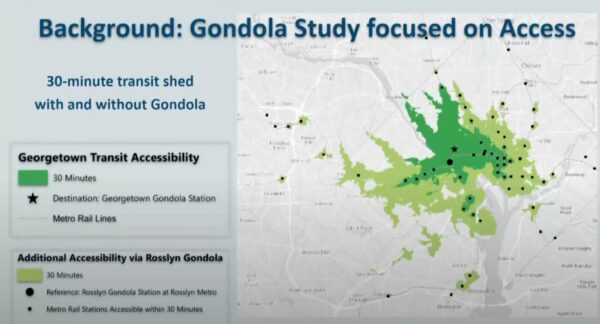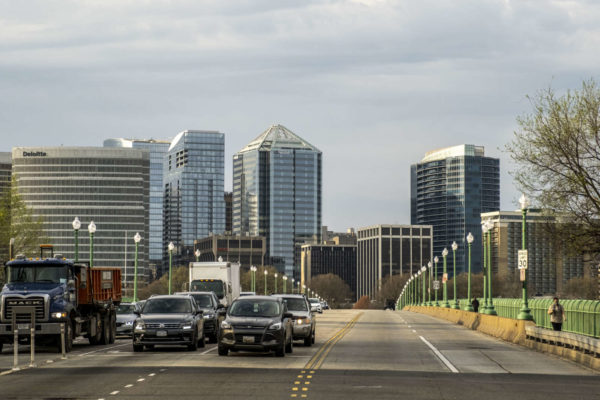A discussion about improving Georgetown-Rosslyn connectivity last night was not supposed to be about the controversial yet ironically beloved gondola.
But the gondola — which 47% of respondents to a recent, unscientific ARLnow poll said they support — was nonetheless on Arlington transportation commissioners’ minds during their Thursday meeting.
The same coalition of D.C. nonprofits and organizations that studied the feasibility of the gondola five years ago is now embarking on a study of other ways to improve transit in and out of Georgetown. Last night, Federal City Council (FC2), a nonprofit dedicated to advancing life in the District, presented the scope of the study to the Transportation Commission.
“I think it’s important to start by saying that tonight, I’m not here to talk to you about the gondola,” said FC2 representative Laura Miller Brooks.
A few commission members had to ask just to be sure. The gondola resurfaced this summer when the D.C. Council approved $10 million in 2022 budget to purchase the old Exxon gas station in Georgetown, a location the could work well as a gondola terminus.
“Is this truly a broad look at transit connectivity between Georgetown and Rosslyn, or [are we] all just doing that wink-wink thing where we pretend it could be anything but everyone knows what’s going to come out at the end?” asked commission Chair and ARLnow opinion columnist Chris Slatt.
Commissioner Richard Price warned against re-exploring the gondola. He endorsed an extension of the Blue Line recently proposed by Washington Metropolitan Area Transit Authority, which would include a second Rosslyn Metro station tunnel and a new Georgetown Metro station.
“Don’t run down a rabbit hole with the gondola — that’s going to make us a laughing stock,” he said. “We need a second Rosslyn tunnel. We need a station in Georgetown. That is the future.”
The $250,000 study is a partnership among FC2, the District Department of Transportation, the Georgetown Business Improvement District and Georgetown University. While the gondola seems off the table, it is why these organizations originally came together in 2016 and partnered with Arlington County. The need for better connectivity remains, study organizers said.
“The core question from the gondola feasibility study — can transit access to Georgetown be improved, especially access to jobs? — still has not been met,” Brooks said.
With 23,000 jobs, Georgetown is one of region’s largest employment centers without convenient Metro access, she said. Better transit would enhance access to jobs, healthcare, hospitality, retail and education for D.C. area residents, putting more people within 30 minutes of a Metro station.

Commissioner Jim Lantelme countered that the proposed gondola would only get folks to the old gas station, leaving them to walk uphill to get to Georgetown University, its hospital, M Street retail or to the West End.
“I always look at that map as being a little disingenuous,” he said.
In addition to encouraging the group to study destinations within Georgetown, commissioners said the group should look into “low-hanging fruit” such as exclusive bus lanes on the Key Bridge and enhanced DC Circulator bus service.
“There are so many more improvements that could be made in terms of frequency, reliability, and customer service,” said commissioner Donald Ludlow.
As for Arlington’s involvement in the new study, Brooks said some transportation staff members are providing input, and FC2 will occasionally present to the Transportation Commission and the County Board.
The public can weigh in now through next Friday to inform the drafting of the study. People will have another opportunity, later on, to provide input on proposed solutions.
Brooks told the commissioners that FC2 sees the study and its possible outcomes as beneficial for Arlington. It will help the county understand how current congestion levels affect bussing, cycling, walking and ride-sharing, she said.
“It will also… hopefully provide a new platform for imagining how Arlington County can connect with Georgetown and create a bigger corridor that benefits economic development, place-making initiatives and creates more cohesive Rosslyn-Ballston, Rosslyn-National Landing, Arlington-Georgetown connections,” she said.


